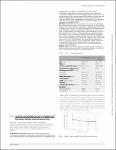FC 096THE EFFECT OF INCREMENTAL START OF HAEMODIALYSIS ON BLOOD PRESSURE AND INTERDIALYTIC WEIGHT GAIN: PRELIMINARY FINDINGS FROM THE ENDURE STUDY
| dc.contributor.author | Hazara, A | |
| dc.contributor.author | Allgar, Victoria | |
| dc.contributor.author | Twiddy, M | |
| dc.contributor.author | Bhandari, S | |
| dc.date.accessioned | 2023-05-09T08:39:45Z | |
| dc.date.available | 2023-05-09T08:39:45Z | |
| dc.date.issued | 2021-06 | |
| dc.identifier.uri | https://pearl.plymouth.ac.uk/handle/10026.1/20847 | |
| dc.description.abstract |
<jats:title>Abstract</jats:title> <jats:sec> <jats:title>Background and Aims</jats:title> <jats:p>Mortality rates are high in patients starting haemodialysis/haemodiafiltration (HD) therapy. Incremental HD may help reduce this risk by reducing the burden of early treatment whilst patients are still adapting to long-term HD therapy. A feasibility study (ENDURE study – Clinical trials ID: NCT04268264) is being conducted with the primary objectives of evaluating the acceptability and tolerance of a new incremental HD regime. Its secondary aims are to evaluate the impact of this form of incremental HD on indicators of patient safety and wellbeing. These indicators include blood pressure (BP) control and interdialytic weight gains (IDWG) which are independently associated with adverse cardiovascular outcomes in patients on long-term HD. We present preliminary findings from the study related to systolic BP and IDWG.</jats:p> </jats:sec> <jats:sec> <jats:title>Method</jats:title> <jats:p>The ENDURE study is being carried out at a tertiary care hospital in the United Kingdom. Patients aged &gt; 18 years known to renal services for at least 90 days, referred for start of HD, were eligible for participation. Following approved consenting procedures, they are started on a new regime of incremental HD starting dialysis twice weekly with progressive increases in the duration and frequency of sessions over 15 weeks. This period is split in to four phases; phase 1 representing the first two days of dialysis (baseline) whereas phases 2 – 4 representing the pre-specified incremental steps. Propensity scores were calculated to match each participant (incremental HD group) with two controls from a database of patients who previously started HD at our centres using the standard protocol of 3 times weekly, 4hr long sessions. The matching criteria accounted for 14 key demographic, clinical and laboratory characteristics. Results were analysed as intention to treat. In comparing BP and IDWG between the two groups, only readings taken pre-dialysis at the first session of the week was considered. This study has been approved by the West of Scotland Research Ethics committee-4 (Ref: 19/WS/0019).</jats:p> </jats:sec> <jats:sec> <jats:title>Results</jats:title> <jats:p>Baseline characteristics of the first 15 participants (target 20) and their matched controls are presented in table 1. The proportion of females and duration of previous specialist input was higher in the incremental HD group.</jats:p> </jats:sec> <jats:sec> <jats:title>Conclusion</jats:title> <jats:p>The ENDURE study tests the feasibility of starting patients on a novel incremental HD regime. Early data suggest that control of systolic BP and IDWG are comparable to patients who start dialysis at 3 times weekly. Further work is needed to understand the impact of reducing dialysis frequency on BP control correlating the findings with changes residual renal function and objective measures of fluid overload.</jats:p> </jats:sec> | |
| dc.subject | Clinical Trials and Supportive Activities | |
| dc.subject | Kidney Disease | |
| dc.subject | Cardiovascular | |
| dc.subject | Clinical Research | |
| dc.subject | 7.1 Individual care needs | |
| dc.subject | Renal and urogenital | |
| dc.title | FC 096THE EFFECT OF INCREMENTAL START OF HAEMODIALYSIS ON BLOOD PRESSURE AND INTERDIALYTIC WEIGHT GAIN: PRELIMINARY FINDINGS FROM THE ENDURE STUDY | |
| dc.type | presentation | |
| dc.identifier.doi | 10.1093/ndt/gfab128.004 | |
| plymouth.organisational-group | |Plymouth | |
| plymouth.organisational-group | |Plymouth|Research Groups | |
| plymouth.organisational-group | |Plymouth|Faculty of Health | |
| plymouth.organisational-group | |Plymouth|REF 2021 Researchers by UoA | |
| plymouth.organisational-group | |Plymouth|Users by role | |
| plymouth.organisational-group | |Plymouth|Users by role|Academics | |
| plymouth.organisational-group | |Plymouth|REF 2021 Researchers by UoA|UoA01 Clinical Medicine | |
| plymouth.organisational-group | |Plymouth|Faculty of Health|Peninsula Medical School | |
| plymouth.organisational-group | |Plymouth|Research Groups|Plymouth Institute of Health and Care Research (PIHR) | |
| dc.publisher.place | 58th ERA-EDTA Congress, 5–8 June 2021 | |
| dc.date.updated | 2023-05-09T08:39:45Z | |
| rioxxterms.versionofrecord | 10.1093/ndt/gfab128.004 |


